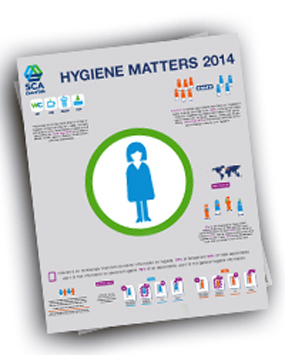
| Archive/Subscribe | TAPPI.org | Advertise | TAPPI Press Catalog | October 2014 |
SCA Survey Shows Need for Increased Access to Hygiene Products, Knowledge
 SCA, Stockholm, Sweden, reports that its fourth global Hygiene Matters survey results reinforce the company’s determination to work even harder to meet women’s needs and desires when it comes to personal and intimate hygiene for themselves and their families. The 2014 consumer survey shows that there are still unmet needs among women globally both when it comes to hygiene products and solutions, as well as raising knowledge about personal hygiene that could help combat taboos, SCA noted. SCA, Stockholm, Sweden, reports that its fourth global Hygiene Matters survey results reinforce the company’s determination to work even harder to meet women’s needs and desires when it comes to personal and intimate hygiene for themselves and their families. The 2014 consumer survey shows that there are still unmet needs among women globally both when it comes to hygiene products and solutions, as well as raising knowledge about personal hygiene that could help combat taboos, SCA noted."This year’s Hygiene Matters survey results show that SCA’s work is relevant and there is still a lot to do for women’s access to hygiene products and solutions, and explaining the close link between hygiene and health. About 80% of SCA’s consumers are women. From a global perspective, a majority of women and girls in the world still do not have access to personal care products such as menstrual hygiene protection," explains Joséphine Edwall-Björklund, SVP, Group Function Communications, SCA.
"Furthermore many women and men don’t have access to incontinence care products. This does not only hold women back to be able to participate fully in society socially, educationally, and professionally, it can also affect women’s health negatively in ways that are easily preventable. There is a clear connection with poor hygiene standards in public restrooms in, for example, work places, schools, hospitals, restaurants, and airports and the spreading of germs and disease, resulting in high costs for private individuals, employers, and society overall. As a leading global hygiene company, SCA can play an important role within this context both from a hygiene and health education perspective," said Edwall-Björklund.
"Women’s possibilities to develop and live their lives to the fullest, are often dependent on access to, and information about, good hygiene. This is clearly expressed in SCA’s sustainability ambitions and is also a key dimension of our business strategy. The survey clearly reveals that female consumers believe that there is room for improvement in many areas related to hygiene and health in both mature and emerging markets. For SCA, this is much more than a business opportunity. This way of thinking is deeply ingrained in our corporate culture," Kersti Strandqvist, SVP, Group Function Sustainability, SCA, pointed out.
SCA emphasizes that the results in this year’s Hygiene Matters survey clearly show that women continue to play a crucial role as change agents, especially in the developing world when they are placed at the center of decisions about water supply, sanitation, and hygiene promotion programs and activities.
SCA launched the first Hygiene Matters survey in 2008. The results in the four surveys to date contain valuable information on a global and local level that can contribute to a more knowledge-based public dialogue with the aim to improve hygiene standards globally, the company said. Improved public and individual hygiene standards will have positive effects on people’s health, while creating value by lowering costs on both a personal and societal level.
According to SCA, answers in the 2014 survey show that the company’s continued initiatives to educate and facilitate solutions for improved hygiene are important. There is still room for improvement on access to hygiene products and solutions, as well as to knowledge explaining the close link between hygiene and health.
In 2014, the three main focus areas of the survey were:
The main findings of the survey were:
The survey was conducted during May 2014, commissioned by SCA, and conducted by the business intelligence firm United Minds and the research company Cint. The survey was conducted in 13 countries: Brazil, China, France, Germany, Italy, Spain, Sweden, Mexico, The Netherlands, Russia, South Africa, U.K., and the U.S. The countries added from the 2011 report were: Brazil, Italy, Spain, the Netherlands, and South Africa. Omitted from the 2014 report was Australia.
Responses were compiled through a web-based survey, and a total of 13,492 respondents. Approximately 500 women and 500 men were surveyed on each market. National quotas have been used to obtain accurate age representation.
Detailed information about the survey is available online.
|

